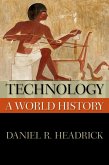Works of Man is a chronicle of man's attempts from prehistoric times to the space age to exploit for his own purposes the slowly discerned laws of nature. Exciting, instructive, and eminently readable, this mine of information covers the broad sweep of technological achievements, from the invention of the wheel more than six millennia ago to the miniaturization of the electronic computer.
Beginning with a description of the early builders in the days of ancient Babylon, continuing through to the end of the Roman Empire, the author goes on to explain the engineering principles that were gradually developed in the Dark Ages, enabling men to build the medieval cathedrals; to try to drain the Pontine marshes near Rome, the meres of Holland, and the British fenlands; and to raise the new military defenses that transformed warfare. Discussion of the work of Leonardo da Vinci and Galileo leads on to the development of steam as a new source of power, and to the growth of civil engineering that followed in Europe and the rest of the world. Further chapters cover the change from sail to steam; canals; railways; the use of electricity; the growth of manned flight; the rise of the plastics industry; nuclear engineering; and the problems of space exploration.
Beginning with a description of the early builders in the days of ancient Babylon, continuing through to the end of the Roman Empire, the author goes on to explain the engineering principles that were gradually developed in the Dark Ages, enabling men to build the medieval cathedrals; to try to drain the Pontine marshes near Rome, the meres of Holland, and the British fenlands; and to raise the new military defenses that transformed warfare. Discussion of the work of Leonardo da Vinci and Galileo leads on to the development of steam as a new source of power, and to the growth of civil engineering that followed in Europe and the rest of the world. Further chapters cover the change from sail to steam; canals; railways; the use of electricity; the growth of manned flight; the rise of the plastics industry; nuclear engineering; and the problems of space exploration.









